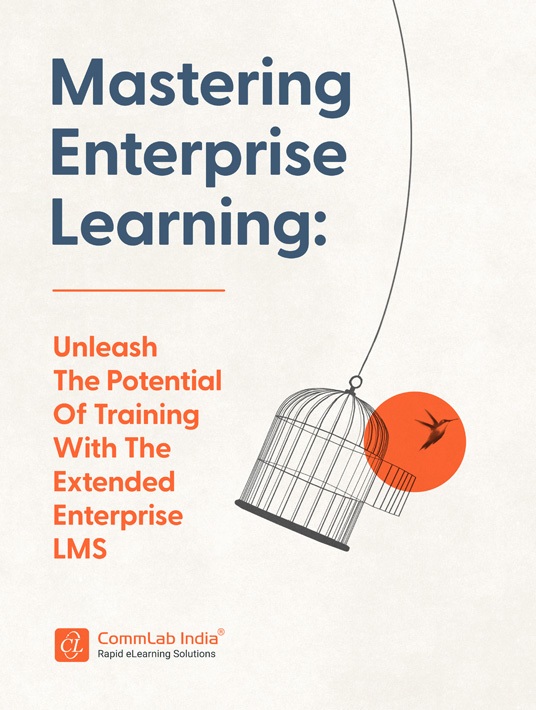How Can An Extended Enterprise LMS Help You Overcome Training Hurdles?
The need for comprehensive training solutions that reach beyond traditional boundaries has never been greater. Discover how the extended enterprise LMS is revolutionizing the way organizations address training challenges.

eBook Release
Mastering Enterprise Learning: Unleash The Potential Of Training With The Extended Enterprise LMS
Delve into the dynamic realm of extended enterprise learning, exploring its myriad challenges and offering innovative solutions to empower your organization.
What Are The Challenges Faced By Organizations In The Extended Enterprise?
Challenge 1: Addressing Diverse Training Audiences Across Locations
- Solution: Implementing a flexible, scalable LMS enables organizations to deliver customized training content to diverse audiences regardless of their location. Utilizing a cloud-based LMS allows for easy access to training materials from anywhere, facilitating seamless engagement and collaboration among dispersed learners.
Challenge 2: Meeting The Varied Needs Of Different Training Groups
- Solution: Adopting a modular approach to training content development allows organizations to create customized learning pathways tailored to the specific needs of different user groups. By providing targeted content and resources aligned with each group’s goals and skill levels, organizations can enhance engagement and maximize learning outcomes.
Challenge 3: Addressing Diverse Motivations Among Audiences
- Solution: Incorporating gamification which has elements, such as leaderboards, badges, and rewards can incentivize participation and motivate learners to actively engage with the content. Additionally, offering a variety of interactivities and real-world scenarios tailored to learners’ interests and career aspirations can enhance motivation and foster a culture of continuous learning.
Challenge 4: Streamlining Training Monitoring and Administration
- Solution: Leveraging advanced analytics and reporting capabilities within the LMS enables organizations to track learner progress, assess training effectiveness, and identify areas for improvement in real-time. Automation tools can streamline administrative tasks, such as course enrollment, progress tracking, and certification management, reducing manual workload and enhancing operational efficiency.
Challenge 5: Managing High Costs Associated With Extended Workforce Training
- Solution: Adopting a pay-per-use or subscription-based pricing model for training services allows organizations to align costs with actual usage and scale training initiatives according to business needs, optimizing resource allocation and cost management.
What Is The White-Labeling Of An LMS?
A white-label LMS allows you to develop training materials that are tailored to reflect your company’s distinct identity. It enhances your brand presence and improves the overall learning experience for your users.
How Do Flexible Pricing Models And Billing Integrations Facilitate The Monetization Of Training Programs?
Pricing models and billing integrations enable the monetization of training programs by providing organizations with versatile options to structure and manage their revenue streams. By offering various pricing tiers, such as subscription-based models, pay-per-course options, or bundled packages, organizations can cater to diverse learner preferences and budgets. This enhances the accessibility of training programs but also maximizes revenue generation potential, ultimately contributing to the success and sustainability of the organization’s learning initiatives.
Strategies For Monetizing LMS Platforms
Subscription Models
Offer tiered subscription plans with varying levels of access and features, providing recurring revenue streams for ongoing access to the LMS platform.
Certification Programs
Develop and sell certification courses or programs within the LMS, allowing users to earn recognized credentials and generate revenue through course enrolment fees.
B2B Partnerships
Forge partnerships with businesses or organizations to provide custom training solutions or resell access to the LMS platform, expanding your customer base and revenue opportunities.
Shopify Plug-ins
Integrate with e-commerce platforms like Shopify to sell courses or training materials directly through online storefronts, reaching a wider audience and driving sales through seamless transactions.
What Features Of The LMS Support Multi-Tenancy To Effectively Serve Multiple Clients?
Custom Branding
The ability to customize the branding and appearance of the LMS interface for each tenant helps create a personalized experience aligned with the client’s brand identity.
Role-Based Access Control
Role-based access control ensures that administrators from each tenant can manage their own users, courses, and content without accessing data or settings belonging to other tenants.
Content Segregation
The LMS should support content segregation, allowing each tenant to upload, organize, and deliver their own training materials independently from other tenants.
Customization Options
Flexible customization options, such as configurable workflows, user interfaces, and language localization, allow tenants to tailor the LMS to their specific requirements and preferences.
API And Integration Support
APIs and integration capabilities enable seamless connectivity with external systems and applications, facilitating the integration of the LMS with other tools and platforms used by each tenant.
How Does The Extended Enterprise LMS Accommodate Custom Branding And White-Labeling Options?
The extended enterprise LMS accommodates custom branding and white-labeling options through several key features:
Customizable Themes and Templates
The LMS provides customizable themes and templates that allow administrators to apply their organization’s branding elements, such as logos, colors, and fonts, to the interface, ensuring a consistent and branded look and feel across all aspects of the platform.
Custom Domain Support
The LMS offers support for custom domains, allowing organizations to host the platform on their domain, further reinforcing their brand presence and identity.
Customizable Email Notifications
Administrators can customize email notifications sent from the LMS to users, incorporating the organization’s branding and messaging to maintain brand consistency.
Customizable Certificates And Badges
The LMS allows organizations to design and issue custom certificates and badges to users upon completion of courses or achievements, featuring the organization’s branding and logos.
The Big Picture
With a focus on empowerment and innovation, the extended enterprise LMS is your ultimate ally in overcoming training challenges and driving success across your entire ecosystem. Embrace the future of training today with extended enterprise LMS!
Download Mastering Enterprise Learning: Unleash The Potential Of Training With The Extended Enterprise LMS today to overcome your L&D challenges with the right training platform.

